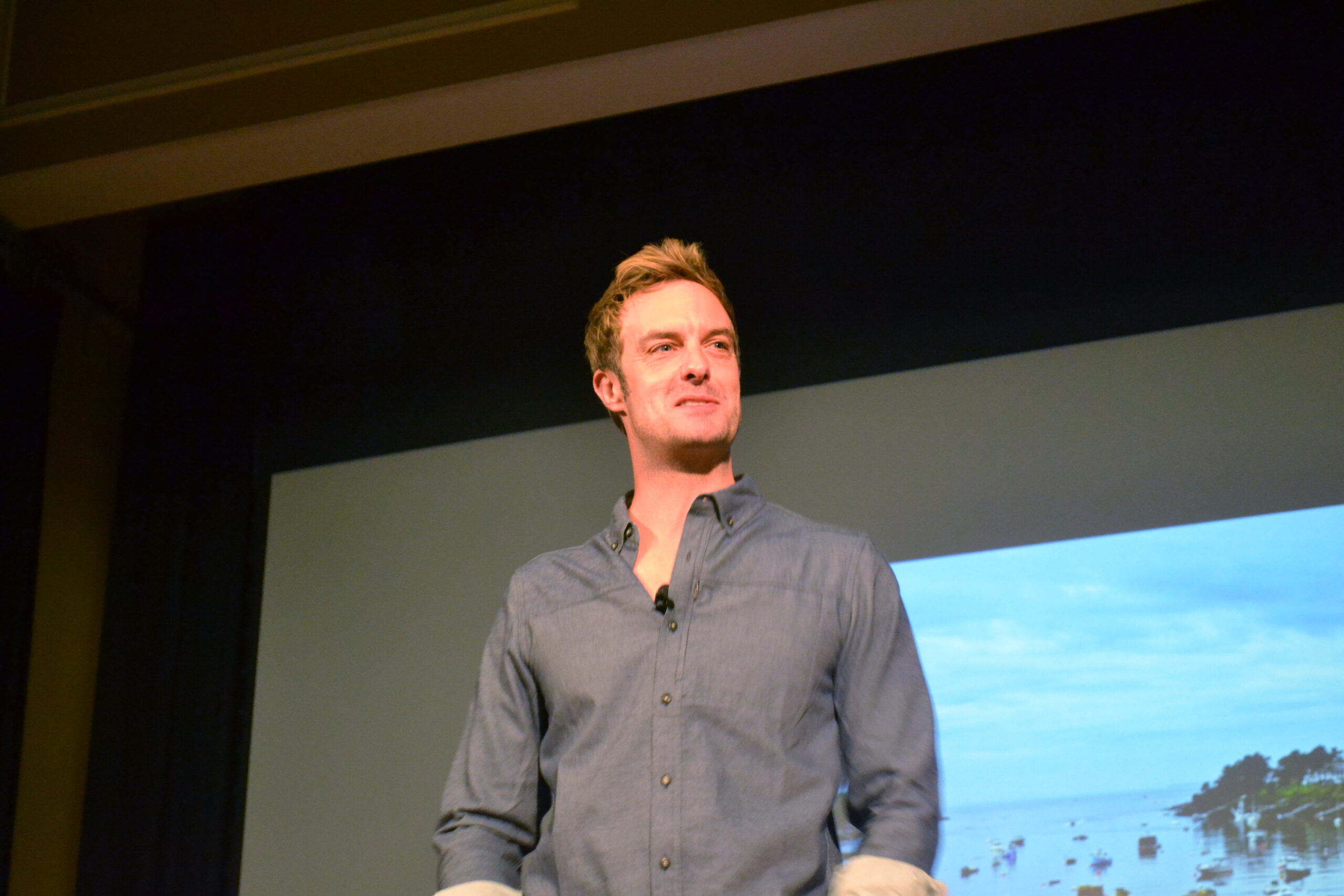J.P. Walsh welcomes Lynsea Montanari to the stage to speak about the importance of seafood and conservation to her native Narragansett tribe. PHOTO CREDIT: Nadia Sutyrina
The University of Rhode Island’s Honors Colloquium showed a different side of culinary education when author, speaker, and chef Barton Seaver highlighted sustainability in seafood.
The presentation, held on Nov. 2, was called “The Future of Seafood: How marine food systems can support healthy oceans and communities.”
Lynsea Montanari, educator supervisor at the Tomaquag Museum and a member of the Narragansett tribe, began the event. She talked about her ancestors and the importance of seafood and conservation in their culture, saying that they rely on it for food and resources. URI is located on Narragansett land, and Montanari discussed the importance of preserving it. She ended her speech with a song from her people.
“Your spirits are washing over me, I know that you are in the sky,” Montanari said, translating the song.
Seaver is one of the world’s leading sustainable seafood experts and educators, according to Dean of the Graduate School of Oceanography Paula Bontempi. Before leaving the restaurant industry to pursue his interests in sustainable food systems, he was an award-winning chef leading top seafood restaurants in Washington, D.C., according to his LinkedIn, becoming the executive chef of Café Saint-Ex and Bar Pilar, as well as helping launch Tackle Box, a casual seafood eatery.
After traveling the world with the National Geographic Society, he brought his experiences into his leadership in the area of sustainable seafood innovations.
“The future of seafood is the future of ourselves, and seafood itself is a measure of dignity,” Seaver said. “I get to spend my days in the quest for food and, to me, that’s so valuable because food is love.”
Born in Washington, D.C., Seaver explored the world around him through the food of various cultures and explained that he was raised to appreciate food and the love behind it. This is how he came to be a chef.
Seaver has had the opportunity to live and work all over the world, and at 24 years old, he was asked to write his own restaurant menu.
“A chef is more than a sum of ingredients that we put on our plates,” Seaver said. “We have the responsibility to sustain those who walk through our doors.”
This was when Seaver discovered his passion for sustainability. He said that one of the most important things in his industry is maximizing the positive impact that the ocean and its ecosystems have, as well as integrating communities into the process of producing seafood.
Seaver has made it his mission to encourage people all over the world to eat more seafood. Seafood is much more sustainable in statistical and environmental metrics than land meat, but the standard American eats 250 pounds of land meat and only 18 pounds of seafood per year, according to Seaver.
“One in 11 people on this planet are wholly dependent on seafood for their livelihoods,” Seaver said. “Seafood simply makes us better.”
Seaver also encouraged the audience to try new seafood and various recipes found in many of the eight books he has written.
When asked his favorite fish and recipe, Seaver said that he preferred slow-roasted bluefish, saying that it brings a pleasant aroma to the house. This was also the recipe he recommended for new and exploring seafood enthusiasts.
Seaver also recommended asking people working at fish markets what they would buy to help them branch out and explore new tastes of the sea.
The next series of the Honors Colloquium will be on Nov. 9 at 7 p.m. in Edwards Auditorium in the form of a panel called “Sustainability through Local and Global Action.”

